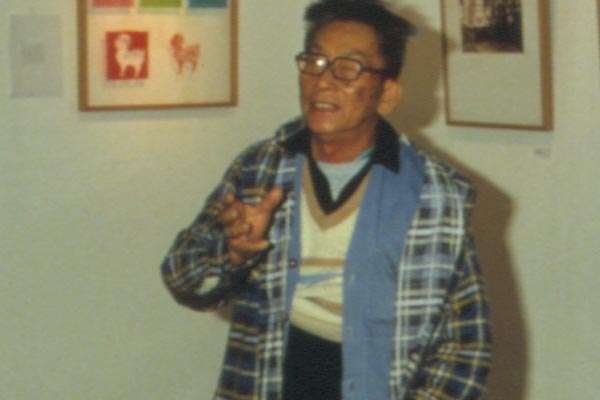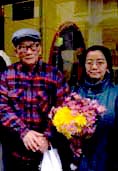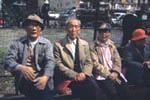

A CD of one hour of Chinese folk music from the region of Southern China where immigration to the United States in the mid 1800's began. Sung by Ng Sheung Chi, or Uncle Ng, who became so well known for his singing, that with very little education, eventually came to be greeted in Washington DC in 1991 by then President Bush after he received the National Heritage Fellowship Award. He was the first Chinese American to do so.
Please help us to raise funds so that this long awaited CD can be published!
 The CD includes the following songs & the complete accurate text of the lyrics in Chinese and English: "Uncle Ng Comes to Gold Mountain" "Toisan Embroidery Song" "Nephew's Letter from the Gold Mountain" "The Story of Gold Mountain" "Eighth Scholar: and "Award Acceptance Song, Washington D.C." Three informative articles complete this CD package, passages of each have been selected here as an introduction. "Introduction: Singing to Remember" by Robert Lee "Muk'yu: Voice of the People" by Bell Yung "The Promotion of Community Muk'yu into the Cultural Mainstream" by Leung Pui-Chee |
 Born in 1910 in Gum Foon, a small village in Toisan County, Mr. Ng was known among his fellow seniors as Ng Bok or Uncle Ng. Uncle Ng learned to sing Muk'yu songs when he was seven or eight years old by listening and imitating other villagers. "I sang whatever came to my mind at the moment." At the age of eighteen, Uncle Ng was a well-known Muk'yu singer among his fellow villagers. "When I sang, even the birds would fly down to listen to my singing." Uncle Ng eventually made his way to America to join his children.
Born in 1910 in Gum Foon, a small village in Toisan County, Mr. Ng was known among his fellow seniors as Ng Bok or Uncle Ng. Uncle Ng learned to sing Muk'yu songs when he was seven or eight years old by listening and imitating other villagers. "I sang whatever came to my mind at the moment." At the age of eighteen, Uncle Ng was a well-known Muk'yu singer among his fellow villagers. "When I sang, even the birds would fly down to listen to my singing." Uncle Ng eventually made his way to America to join his children. In addition to the traditional repertory of love stories, he particularly favored those songs that recount the experiences of the early Chinese immigrants. He wrote a song that vividly describes his own experiences entitled, "Uncle Ng Comes to Gold Mountain". This song touches upon the difficulties and ironies of the Chinese American immigrant situation, of why he left China, of conditions in Chinatown, and life everywhere. "... How many people in the world believe, that life gets easier when there is money and rice..."
 The Arts Centre produced a video documentary on Uncle Ng in 1991 entitled, "Singing to Remember" which traveled to many video festivals. In 1992 he was named a recipient of the prestigious National Heritage Fellowship, and became the first Chinese American to receive such an award. Uncle Ng along with twelve other master practitioners of a traditional art or craft, was recognized for making "valuable artistic contributions both to their local communities and the country as a whole. They give vivid testimony to the creative genius of the many peoples who compose our nation."
The Arts Centre produced a video documentary on Uncle Ng in 1991 entitled, "Singing to Remember" which traveled to many video festivals. In 1992 he was named a recipient of the prestigious National Heritage Fellowship, and became the first Chinese American to receive such an award. Uncle Ng along with twelve other master practitioners of a traditional art or craft, was recognized for making "valuable artistic contributions both to their local communities and the country as a whole. They give vivid testimony to the creative genius of the many peoples who compose our nation."The Toisan people constitutes the largest Chinese immigrants in America in the early years. Consuquently, most 3rd 4th and even 5th generation Chinese in America are of Toisan ancestry. The roots of these Chinese Americans form the foundation of the history of Chinese in America.
Professor Bell Yung states, "One distinctive feature of muk'yu songs is in its performance practice and social function: while most other types of quyi are performed mainly by professional singers for a paying audience, muk'yu songs are generally sung by ordinary people for their self-enjoyment: men and women, at work or at leisure, singing mainly to and for himself or herself. These songs are enjoyed for their own sake, and may be truly called grassroot voices of the people."
As Robert Lee, Executive Director of Asian American Arts Centre puts it, "For me, Uncle Ng's Muk'yu singing reflects a part of the American historical experience and the meaning of being Chinese in America."

Please download this pre-order form, in PDF format.
For more information, contact aaacinfo@artspiral.org.
Return to Traditional Arts